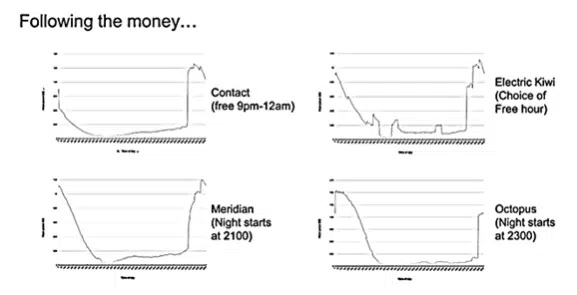FlexForum had 44 people from across the electricity ecosystem come together virtually on Wednesday 17 April to share their experience and perspective on the electric vehicle (EV) charging choices of households and businesses.
The session kicked off a 3 workshop co-design process to produce a workplan setting out the actions required to make flexible charging and flexible chargers an easy and obvious choice households and businesses with EVs.
The perspective emerging from workshop 1 is that flexible EV charging is the easy and obvious choice for EV owners with well over half of EV owners charging ‘flexibly’ in response to retail TOU pricing.
People altering their electricity use in response to an external (price) signal is definitely a real-life demonstration of flexibility. Here are four examples of flexible charging in practice.

However, flexible (or smart) chargers are not the easy and obvious choice for EV owners because the extra investment is currently not worth it…'when 90% of the benefits are currently available from a timer or my in-car features' (as someone said at workshop 1).
Flexible chargers – meaning devices which coordinate charging and are integrated into the power system and market – are a relatively more expensive and more complex option for people to capture the value currently on the table.
In reality, the value on the table today is unlikely to make the extra cost of a ‘flexible charger’ stack up. To get benefits from flexibility, EV owners do not need to incur the cost and hassle involved in purchasing and installing a flexible EV charger, because they can (and do!) respond to price signals using a variety of cheaper and simpler devices and practices such as ‘smart’ timers, in car features or just flicking the switch.
This is not the end of the story though.
One estimate looking at network investment to cater for expected EV charging related capacity requirements found that flexible charging ‘…can enable EV uptake to occur with little or no increase in peak demand: A $1.7bn additional prize on top of the CCC’s estimated $18bn economic benefits from transitioning from ICE vehicles to EVs.’ Basically flexible chargers can avoid or at least delay a big chunk of investment in extra network capacity when the owner agrees to let it provide a dedicated response to changing network conditions when asked.
Unfortunately, the value of avoiding future network investment is not currently fully monetised or available to EV owners. If it was, it would help offset the high purchase and installation costs that people see as the main barrier to choosing a flexible EV charger. Fortunately, the Commerce Commission will hopefully lower the barrier by enabling network operators to monetise this value though the 2025 reset of the electricity default price-quality path.
Even more value could be available to put on the table because flexible chargers integrated into the electricity system and market should help to reduce the size of the future generation build; especially the generation plant that is needed to meet our system ’peak’, which seems to be in short supply right now.
Once the initial hurdle of “value” is overcome there several process-related issues to resolve to make flexible EV chargers the easy and obvious choice for households and businesses:
